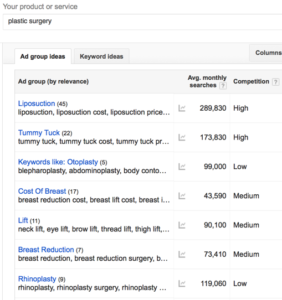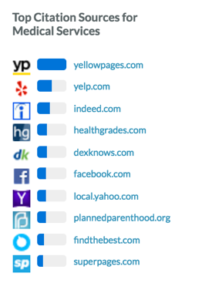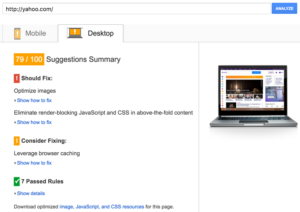Search continues to dominate in terms of online traffic and there are 7 SEO essentials to rank your plastic surgery website online.
Google alone processes billions of queries every single day including searches with local intent. Ranking for your target keywords can drive more customer inquiries to your plastic surgery practice. But make no mistake, other practices are all likely competing for the very search terms.
Competition in your space is likely incredibly competitive given that a single client can potentially be worth thousands of dollars and possibly even more. So how can you push your website higher up for search terms related to “plastic surgery”?
This is where search engine optimization comes in.
Why Your Plastic Surgery Practice Needs SEO
A study from Advanced Web Ranking found that the top 5 results account for 67.60% of all clicks while positions 6 to 10 only attract about 3.73%. The second page attracts about the same number of clicks as the bottom results in the first page. Only a small percentage of users click past the second page.
The data makes it clear that you need strong SEO to even have a chance at competing.
Here we look at 13 essentials to get your plastic surgery website ranking higher in the search results.
1. Target the Right Keywords
Your target market is likely searching right now for services that your practice offers. Keyword research is the process of identifying those search terms so you can optimize your landing pages accordingly. This step is easily one of the most important as you want to target the right keywords.
Use Google’s Keyword Planner tool to identify relevant keywords:
Go too broad and you can easily spend years attempting to rank for those keywords. But go too narrow and you likely won’t generate any traffic. One approach is to target long tail keywords as they strike the perfect balance.
Examples include:
- Tummy tuck surgeons in Austin
- Liposuction cost in Texas
- Plastic surgeons in West Lake Hills
Add the city names to your keywords to attract more local searches.
2. Optimize Your Title Tags
Titles are one of the most important on-page factors.
They are the first thing that visitors see in the search results and Google gives them a great deal of weight in terms of SEO. Consider the following result for “plastic surgery Austin”:
And this one:
The first is much much targeted and relevant compared to the second result. It’s not surprising then that the first result ranks higher. Here are some tips to write better optimized title tags:
- Keep the title under 70 characters as Google truncates titles that are too long
- Include the most important keywords at the very beginning
- Use pipes or hyphens to separate the title and company name
- Make your titles more enticing to increase click through rates
- Do not duplicate any of your page titles
3. Provide Value With Content
Your pages likely won’t rank or result in conversions if the quality of your content is lacking. While it is a good idea to optimize your content, remember not to stuff it with keywords as doing so can result in a ranking penalty. The key is to focus on providing value to your target market as it lends credibility to your practice.
One way to do that is with blogging.
The keyword research process is valuable for another reason: Content ideas.
People who are interested in getting any type of plastic or cosmetic surgery done have lots of questions. “What results can I expect?” “How much does the procedure cost?” “What is the recovery process like?” These make for excellent topic ideas that you can then create valuable and engaging content around for your target market.
4. Build Authority With Local Citations
A citation is a reference to your business’s name, address, and phone number (NAP) on other web pages such as a yellow pages directory or a local business association. Citations are a key component of ranking in the local search results as Google uses these signals to evaluate the authority of your business.
But just like links, not all citations are the same.
Aim for citations from relevant sources such as industry-focused directories or blogs. A citation from one of these sources will carry far more weight than a citation from an irrelevant forum or spammy site.
Here are some excellent citation sources for medical services:
Another thing to keep in mind is the consistency of your listing. Citations on other web pages that mention your business should match the exact NAP that is on your site. Pick one format and stick with it whenever you create profiles on other sites.
5. Be Social
Social media simply cannot be ignored.
Facebook alone has over 1 billion active users while Twitter has over 300 million. There is also data to suggest a correlation between shares and rankings. In other words, pages that have been shared more times tend to rank better than those that don’t have any shares.
Social media is also another reason: Visibility.
Sharing content relevant to your industry and engaging with your target market all help to spread the word about your practice. So set aside some time to implement social media as it can help strengthen your SEO campaign.
6. Improve Site Speed
Every second counts.
And each one that passes while your pages load increases the likelihood of your visitors leaving. The average user is incredibly patient and will not hesitate to leave your site if it takes more than a few seconds to load. Site speed is even a ranking factor so your pages could be ranking lower if they load too slowly.
The PageSpeed Insights provides a ranking score for how fast your site is on mobile and desktop as well as suggestions.
Here are some ways to increase your site speed:
- Use compression to reduce the size of your CSS, HTML, and JavaScript files
- Compress your images and reduce their file sizes
- Reduce the number of redirects to your pages
- Enable browser caching
- Use a content delivery network
Implement these together to dramatically improve your site speed.
7. Go Mobile
Mobile is so important that Google has even made it a ranking factor. What the update means is that your rankings in the mobile search results will decline if your site is not optimized for mobile devices.
Here are the steps to make your site mobile friendly:
- Run your site through Google’s tool: The Mobile-Friendly Test lets you check whether your site is mobile friendly or not. Enter the URl of your site and click the Analyze button.
- Choose a configuration for your site: If your site is not mobile friendly, it needs to be a priority. There are different formats but responsive design is Google’s recommended configuration. This means that your site dynamically changes to accommodate all screen resolutions.
- Follow best practices: Be sure to follow all mobile best practices. Text should be easily readable without having to zoom and links should be far enough apart that the one one can be tapped. If you meet all requirements then your site should have a mobile friendly label in the search results.
Follow these SEO practices to drive more customer inquiries to your plastic surgery practice.



